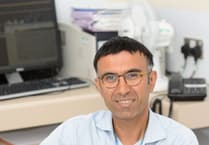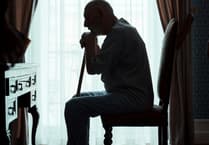A DENTIST has spoken out about dental health during lockdown, the government’s response to his industry and what he is doing to ensure the physical and mental health of patients and staff is looked after when he reopens.
In a letter to England’s practices late last month, NHS chief dental officer Sara Hurley asked dental practices to “assess” whether they had adequate infection prevention and personal protective equipment in place and, if so, requested they open again on Monday, June 8 for those in need of treatment.
These treatments will be slowly phased in, with those who are more in need of dental care taking priority.
Castleton Dental Practice in Farnham is one of many local practices is planning to reopen soon – Monday in Castleton’s case – as patients all over the country battle to see their dentist after lockdown measures were eased.
Dr Peter Johnston, who set up the practice in 1998 and has been qualified in the industry for nearly 30 years, spoke about his concerns for patients who have taken matters in to their own hands regarding their oral health.
He said: “We have been restricted to triaging patients from home by telephone using something called ‘AAA’ (advice, analgesia and antibiotics), which has pressurised the profession in to over-prescribing antibiotics.
“When someone has a big facial swelling, the only treatment available remotely is going to be antibiotics.
“I feel we’re doing a disservice to patients by not seeing them in the first place – and then we’re doing another disservice to them by treating them with antibiotics. But our hands were tied. It was the only option open to us.”
The opening of practices across the country has brought mixed reviews, with many people suffering from tooth problems relieved they finally have the chance of getting treatment after months in lockdown.
However, some in the industry feel they should have had more time to prepare, as England prepares to return to a ‘new normal’ with lockdown restrictions being eased in the past few weeks.
Dr Johnston is one of many dentists up and down the country who has been dissatisfied with the government’s response.
“They haven’t provided us with enough guidance or advice or clear instruction about what we should be doing, when we should be doing it, who to and how to,” he said.
“The announcement on May 28 gave us just six working days to go from nothing to being open again.
“It’s not just the case of unlocking the front door and starting again.
“Our practices have been shut down for weeks so we’ve got to source PPE, we have got to come up with new standard practice procedures, and we have to risk assess everything.
“And as much as you could say ‘why didn’t we do that in the nine or ten weeks of lockdown, you’ve had up until then, you’re doing nothing else so you could have done it’, you need guidance on where you expect it to be going – and there was no guidance on that until last Thursday at 3pm on standard operating practices, which then effectively gave us just one working day.”
The experienced dentist, who is yet to open the Castleton Practice because he is still preparing for a safe re-opening, has been busy putting things in place to ensure patients and staff are well protected from the virus.
“In the surgeries, we have put up Perspex screens and have developed a contactless way of dealing with patients to the best of our ability,” he said.
“We are closing the waiting room, we’re having a closed front door policy, patients will only arrive at the appointed time and staff will escort them through the building.”
Patients at the practice will also be provided with a mask and it will be mandatory for patients to use a mouthwash.
The administration side of the practice, including paying and setting up future appointments, will be done remotely – and a one-way system has been developed so patients do not come into contact with each other.
In a study of more than 2,000 dental practices in England, the British Dental Association (BDA) found more than 60 per cent estimate they will be able to treat fewer than a quarter of patients who came through the door compared to before the coronavirus epidemic.
Those who are lucky enough to get an appointment may not even be able to get the treatment they need, and only one third of practices have the necessary PPE to provide the face-to-face care required in the profession as of last week.
In the same study, it was revealed more than 75 per cent of these 2,000 practices faced cashflow problems as they continue to pay business rates during the crisis, with the BDA also highlighting the difficulties they faced trying to adapt to social distancing policies.
Dr Johnston highlighted the financial problems dentists across England face without support from the government – and the importance of private dentistry in helping the National Health Service.
“If private dentists collapse, the NHS is going to be inundated with patients. It’s going to go in to meltdown – it can’t cope. The private sector actually serves a purpose of alleviating the NHS.”
The economy is not the only concern for the dentist – a high number of people have been feeling low during the epidemic because of many reasons, and he stressed the importance of assessing the mental health of some people, especially with so many losing family and friends during the crisis.
He said: “I have weekly meetings with my staff on Zoom to just see how everyone is – it’s the touchy-feely side of dentistry, I suppose, just making sure everyone is okay.”
As the world of dentistry gets back up on its feet, practices face financial and human-based issues, as the reality of the coronavirus pandemic hits England – even after passing the peak of the virus.




